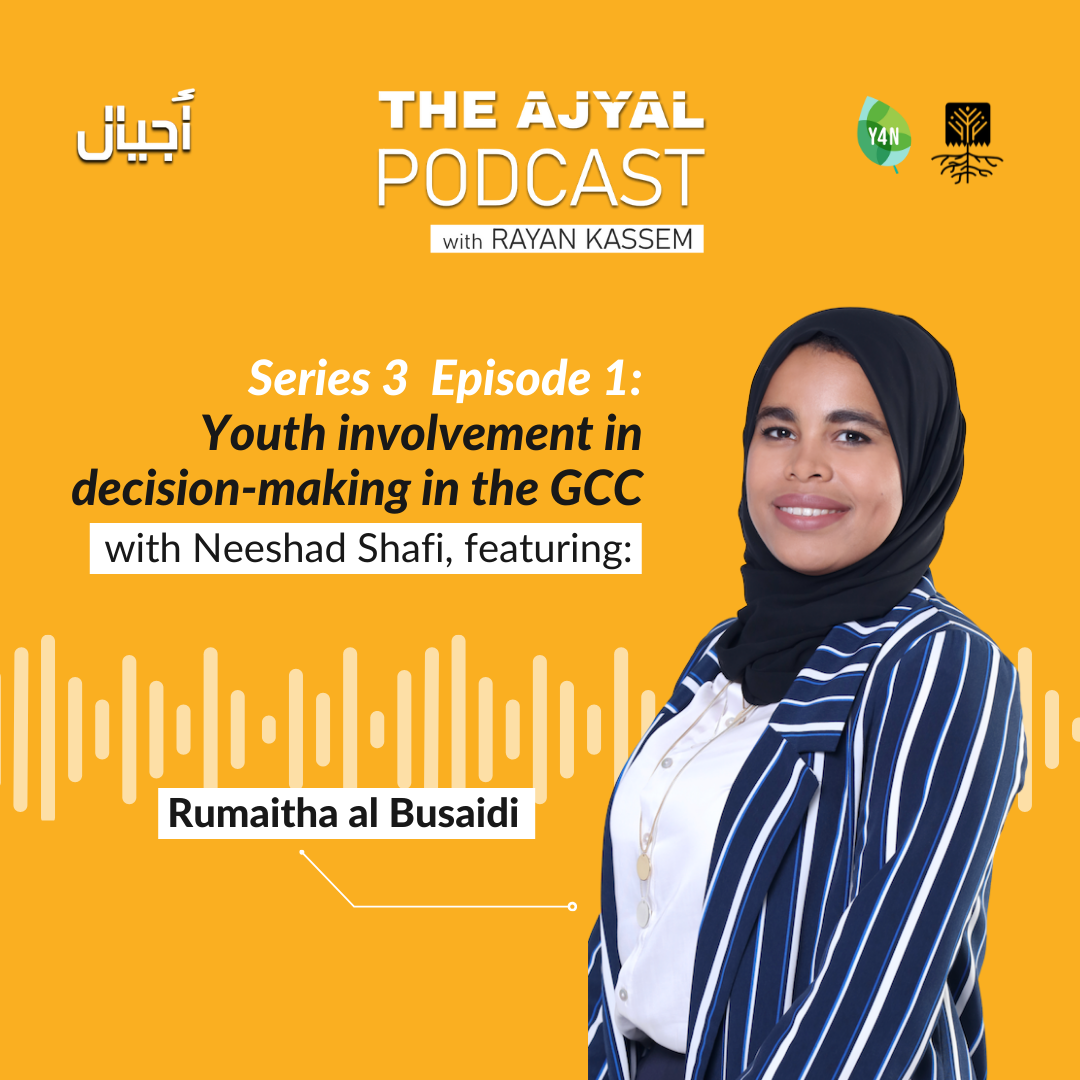From the Gulf Cooperation Council, to big green projects, to women in leadership, in this series we are diving into what youth in the Arabian Gulf think about climate and nature decision-making. Tune in!
This series is brought to you in collaboration with the Arab Youth Climate Movement - Qatar.
You can find the links below to watch and listen to the episodes! Video format on YouTube and in audio format on apple, spotify, and google.
The focus of this series will be on youth from the Arabian Gulf region. We will discuss youth priorities, challenges, and solutions in the Gulf within the nature and climate space. The focus is to create a space for youth perspectives on policies and decision-making within the Arabian Gulf. We want to provide a space for Gulf youth to express their demands, solutions, and regional climate struggles with youth from around the world and try to highlight some key points that can enable other youth to support and amplify the messages being convened by Gulf youth.
Disclaimer: There are many intersecting realities and experiences that influence youth perspectives and it is nearly impossible to speak on behalf of "all youth". With this in mind, we remind you that our guests are speaking from their experiences and communities, and not on behalf of all Arabian Gulf youth. Together, we explore nuance, counteract tokenism, and uplift individual stories to build bridges for change.
E1: Youth Involvement in Decision-making in the GCC
Established in 1981, the Gulf Cooperation Council (GCC) is a regional, intergovernmental, political, and economic union formed between Bahrain, Kuwait, Oman, Qatar, Saudi Arabia, and the United Arab Emirates and headquartered in Riyadh, Saudi Arabia. The council’s basic objectives include economic and financial affairs, commerce, customs and communications, education and culture, social and health affairs, information and tourism, and legislative and administrative affairs. What’s missing from this list? Climate and nature. In this episode, we propose and discuss whether having nature and climate-specific objectives within the union would reinforce and strengthen cooperation to tackle the climate crises in the Arabain gulf, especially from a youth perspective.
Top takeaway: Complex economic priorities prevent the GCC from currently adding a climate objective, however, it can be a uniting platform for Gulf youth to raise awareness and unite for change.
Episode Guest: Rumaitha al Busaidi (Oman)
Founder of WomeX; a platform teaching negotiation skills to Arab women in order to nurture a new wave of girl bosses in the region.
Co-chair of the World Economic Forum’s Davos Lab Task Force; the first intergenerational lab aimed at self-awareness, systems leadership, and allyship to help shape the world's post-COVID recovery.
Youngest Omani woman to step foot on the South Pole.
E2: Green Initiatives in the Gulf: A youth perspective
From the Qatar Fifa World Cup to the Middle East Green Initiative to Masdar City, big green projects have been emerging in the Gulf as a strategy to tackle the climate crisis. However, these projects and others are only presented to the public once the decision-making process has been completed, almost always without the involvement of youth. In this episode, we have an open discussion with guest Abdul Rahman Al Mufta (Qatar) about whether Gulf youth agree with the sustainability of these projects and whether they have proposals to improve or modify them. We want to highlight that youth have concerns and expertise that can benefit these big green projects and should be part of decision-making processes, especially projects involving the future we will inherit.
Takeaway: Green initiatives in the Gulf cannot always be directed towards greenwashing. They are the first steps the region is taking towards a greener future.
Episode guest: Abdul Rahman Al Muftah (Qatar)
Part of the sustainability and environment team of the Supreme Committee for Delivery & Legacy for the Fifa World Cup’s 2022 sustainability strategy.
E3: Women Leadership for Climate in the Arabian Gulf
“Recognising women as decision-makers, stakeholders, and experts at all levels can lead to successful, long-term solutions to climate change.” - IUCN.
This episode aims to discuss the challenges and barriers that women face in leadership positions and the potential for change. We want to elaborate on the social stigmas that de-motivate women from leadership in the climate and nature space and discuss how overcoming these stigmas and involving women in leadership positions can benefit the climate movement in the region and foster positive change for people and for nature.
Key Takeaways: The enhancement of women's leadership in decision-making is two-fold; we must 1) create more opportunities for women from the top AND 2) encourage women to take on leadership roles already available to them by enhancing awareness.
Episode Guest: Fatema Frutan (Bahrain)
Deputy Chief of the Environmental Citizenship Program at the Bahrain Women Association for Human Development.
Former Board of Directors member of the Bahrain Women Association for Human Development.
Let us know what YOU think about this series in the comments below! We want to hear from you!










